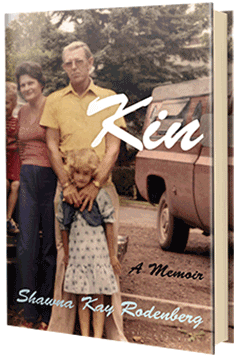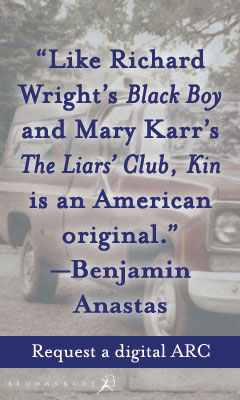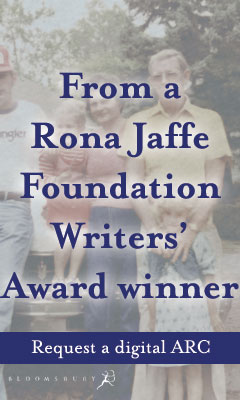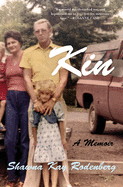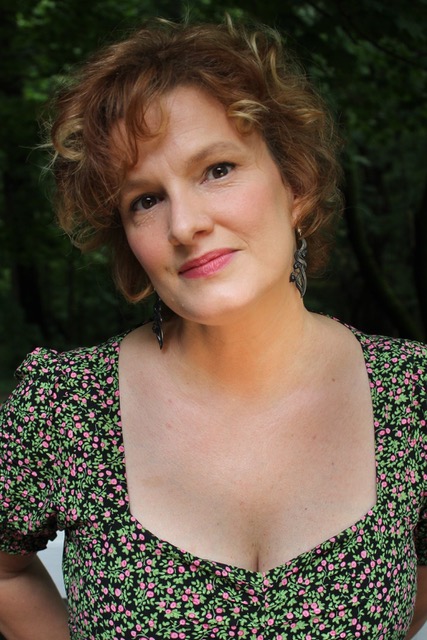Kin: A Memoir
by Shawna Kay Rodenberg
Shawna Kay Rodenberg's harrowing memoir Kin leads the reader backward and forward in time and across an American landscape of trauma and healing. With a persistent focus on family and home, Rodenberg documents a process of learning and personal growth that is both unique and universal.
Kin opens in 2017, as the author guides CBS reporters though her native eastern Kentucky. They seek to crack open what they see as Trump country, and Rodenberg hopes to complicate that story. The backdrop is "my family's mountain, the mountain where my grandfather mined coal, where my father was reared with great love and brutality, where I picked my grandmother's strawberries and my grandfather's roses... the mountain on which my family sought refuge after leaving The Body, an end-times wilderness community, cloistered in the woods of northern Minnesota, that my father joined when he was red-eyed and mad with fear, following his tour of duty in Vietnam." The narrative then moves back in time to Rodenberg's childhood in Grand Marais, Minn., and the purposeful deprivations of The Body.
Rodenberg's upbringing in this strict religious sect gives her a cultural background that will make it hard for her to fit in later, and she suffers more than one form of abuse within The Body, including her father's recurrent rages. "Instead of following in alcoholic, workaholic footsteps, he made religion his primary vice, religion that was unconventional, ecstatic, even perhaps rebellious--and virtually militaristic, which must have felt familiar." The family eventually moves back to the secular world, to Ohio, to Kentucky and finally to the mountain of family origin. The austere, often angry influences of The Body will follow them.
This memoir recounts family stories, some from Rodenberg's memories, some passed down. She writes of each of her parents' childhoods, and of her aunts, uncles, cousins, grandparents and neighbors. She recounts the history of her hometown, Seco, Ky., a former coal-mining camp. Kin begins well before the traumatic story of Shawna's birth, "bruised-ass-backward into a world of chaos." The chronology is disjointed, jumping back and forth, shifting timelines as well as locations, which can be disorienting for the reader, but that effect feels true to the narrator's experience: Kentucky exerts a strong pull even in Minnesota, and pains felt by generations past are ever present.
At each stage, Rodenberg struggles with the meaning and shape of love and caring, and the confusing truth that those who love us most can hurt us most. Religion will continue to play a large role in her life, complicated by her father's movements to and away from a strict adherence to The Body's teachings. She will continue to wrestle with sex and the aftermath of childhood sexual abuse, through her troubled first attempt at college and beyond. Kin closes with Rodenberg on the cusp of pregnancy and marriage, but hints at what is to come: "I wish I could tell [that earlier version of myself] she had come to the beginning, not the end."
Rodenberg's prose is graceful and effortless, vulnerable and raw, beautifully descriptive without drawing attention to itself. She emphasizes character of place, from coal country where women "kept the food covered and draped cribs with quilts to keep the dust off their babies" to "town-sized time capsules, stoppered and sealed.... Barns sank beneath fields of kudzu and the roofs of old houses bowed in the middle like the backs of the ancient, singular mares that waited outside to be fed and put away."
While Kin is first and centrally a memoir of family, it is also about Appalachia, about histories more complicated than the opening scene's reporters care to see. It is ultimately about forgiveness, understanding and love. Rodenberg seeks an emotional reconciliation with her parents, especially the father she has butted heads with all her life. Of that battle, "even now, writing about it fills me with worry that I might be inadvertently reengaging, and that is why talking about it, why telling was and still is the hardest thing.... This is what it means to come from people who have been broken and exploited, they see the world in sides, theirs and the other, and disloyalty is the gravest offense, the blasphemy of the mountains." In a world of just two sides, it might be an act of rebellion to both love someone and hold them responsible.
As narrator, Rodenberg is intelligent and insightful. As character, she is resourceful, scrappy, defiant, brave and exposed. Her memoir is heart-rending and hard-won. "I didn't know when I started writing this book that it would become my own book of Revelations, rife with warning and promise, an account of my own and other apocalypses that created me, end times that predated me but shaped me as surely as if I'd lived through them myself." That sense of regional and filial legacy defines Kin, a work of nuance that complicates received narratives in all the best ways. --Julia Kastner



